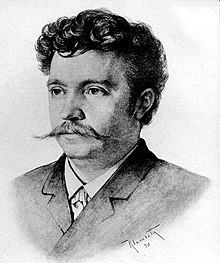Fritz Steinbach
Fritz Steinbach (born June 17, 1855 in Grünsfeld , † August 13, 1916 in Munich ) was a German conductor and composer .
Life
Fritz Steinbach came from a family of musicians in Baden . He studied at the Leipzig Conservatory and in Vienna with Martin Gustav Nottebohm (theory and counterpoint ) and Anton Door (piano). From 1874 to 1878 he was a scholarship holder of the Frankfurt Mozart Foundation . After initially working as a composer, he began his career as a conductor in Mainz in 1879 as 2nd Kapellmeister . He then worked as a teacher for composition and counterpoint at the Hoch Conservatory in Frankfurt am Main.
In 1886 Fritz Steinbach took over the court orchestra in Meiningen from Richard Strauss for 17 years as court conductor, which Hans von Bülow had previously formed into an elite orchestra from 1881 to 1885. In Meiningen, Fritz Steinbach worked closely with Johannes Brahms , who from 1881 to 1896 was a guest of Duke Georg II and the court orchestra 15 times . Steinbach thus developed into the most famous Brahms conductor who had Brahms' works performed the most by far. In doing so, he expanded Brahms' good position in the concert world and established a special Brahms care program in the town of Meiningen that continues to this day.
Steinbach sought to profile the residential town of Meiningen into a Brahms town based on the model of Bayreuth , which included the construction of a Brahms concert hall with an attached conservatory. To this end, in 1895, 1899 and 1903 he initiated three successful Meiningen regional music festivals of Saxony-Meiningen , tailored to the works of Brahms , which attracted numerous Brahms connoisseurs and received great attention in the European music world. In 1895 Johannes Brahms himself was present as a guest of honor. Under the direction of Fritz Steinbach, the orchestra went on tour again from 1897 and gave 297 guest performances in 85 cities in Switzerland, Holland, Denmark, England and Bohemia. Steinbach played a key role in the erection of the first German monument to Brahms, built by the sculptor Adolf von Hildebrand in Meiningen in 1899 .
After the failure of his plans for a conservatory in Meiningen , Fritz Steinbach moved to the Gürzenich Orchestra in Cologne in early 1903 and became director of the Cologne Conservatory . There he taught composition and orchestral conducting until July 1914. His students included Alfred Hoehn , Hans Knappertsbusch , Adolf Busch , Eduard Zuckmayer and Franz Mittler . Fritz Steinbach then retired to Munich, where he died of a heart attack in 1916. His grave in the Munich forest cemetery was leveled. He was a member of the Mainz Masonic lodge, Die Freunde zur Eintracht .
Works
- Opus 7, Septet in A major for oboe, clarinet, horn, violin, viola, violoncello and piano, Verlag Schotts Söhne, Mainz, 1882.
literature
- Walter Blume: Brahms in the Meiningen tradition - his symphonies and Haydn variations in the name of Fritz Steinbach , Stuttgart 1933.
- Meiningen Kuratorium: Stadtlexikon Meiningen , Bielsteinverlag Meiningen, 2008. ISBN 978-3-9809504-4-2
- Steinbach, Fritz . In: Wilibald Gurlitt (Ed.): Riemann Musiklexikon . 12th, completely revised edition. Persons part: L-Z . Schott, Mainz 1961, p. 726 .
Web links
- Fritz Steinbach's estate in the Basel University Library
- Meiningen music history, Meiningen museums
- Biography on rhoen.info
- Sheet music and audio files by Fritz Steinbach in the International Music Score Library Project
| personal data | |
|---|---|
| SURNAME | Steinbach, Fritz |
| BRIEF DESCRIPTION | German conductor and composer |
| DATE OF BIRTH | June 17, 1855 |
| PLACE OF BIRTH | Grünsfeld |
| DATE OF DEATH | August 13, 1916 |
| Place of death | Munich |

